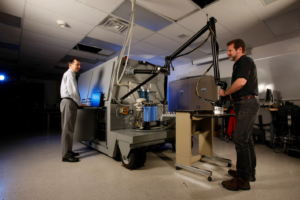LSP Technologies Sells Nondestructive Laser Bond Inspection System
With the recent sale of a Laser Bond Inspection (LBI) system, LSP Technologies has achieved another milestone in the commercial integration of LBI technology.
Posted: January 31, 2017
By:
With the recent sale of a nondestructive Laser Bond Inspection (LBI) system, LSP Technologies has achieved another milestone in the commercial integration of LBI technology. The implementation of LSPT’s proprietary LBI system marks another major airframe manufacturer to pursue implementing Laser Bond Inspection in their production process, further supporting Laser Bond Inspection as a reliable method for validating adhesively bonded structures.

As the aviation industry increasingly works to make aircraft lighter, safer, and more fuel-efficient, aeronautical engineers are incorporating more composite elements such as carbon fiber into their vehicle designs. Composite airframe structures have the advantages of being lighter and more resistant to fatigue or corrosion damage than their metal counterparts. Composite panels are joined together using adhesive bonding agents, rather than traditional rivets or fasteners, which necessitates a new inspection process to interrogate the strength and safety of the composite bonds.
LSP Technologies’ nondestructive inspection (NDI) method uses a high-energy pulsed laser to propagate a controlled stress wave through the composite material. The wave subjects the bond line to a tensile stress which is tailored to a percentage of the bond’s delamination threshold. If the bond is sufficient, it will be unaffected by the stress wave and can be considered safe for use.
LSPT’s Laser Bond Inspection system is the culmination of more than a decade of collaboration and development work by LSP Technologies, the U.S. Air Force, and major aerospace OEMs. The equipment purchased is a mobile, cart-mounted LBI system that can be used to conduct inspections on bonded structures in production and depot environments.
Substandard adhesive bonds can result from errors in surface preparation, adhesive mixing, or from contamination effects. Ultrasonic examination is the preferred NDI method for evaluating adhesive bonds, but the process is unable to reliably detect kissing bonds and cannot measure bond strength. Kissing bonds are areas where the composite panels are in intimate contact, but retain little to no adhesive strength. Laser Bond Inspection is the only method capable of reliably detecting kissing bonds, and the only available nondestructive inspection method for proof-testing localized bond strength.
As the aviation industry transitions to a greater reliance on bonded composite structures, Laser Bond Inspection technology will play a crucial role in the nondestructive certification process. LSP Technologies is proud to be the sole supplier of LBI systems that represent the forefront of adhesive bond inspection technology.
To learn more about Laser Bond Inspection or laser peening for fatigue enhancement, please Contact Us today.
Interested in Seeing More?
Tell us about your application, material, or failure mechanism and we will have one of our experts reach out to you. Our extensive library of research and years of experience gives us a unique advantage to apply a finite element analysis to help diagnose the best application for your situation.
